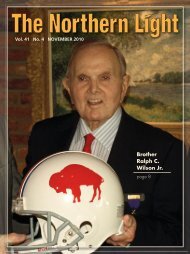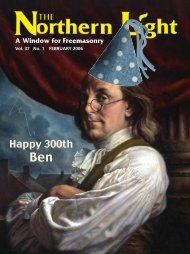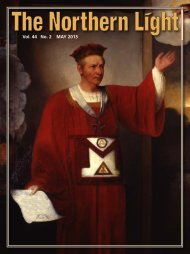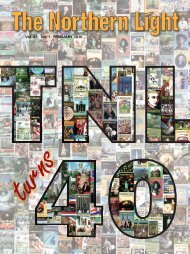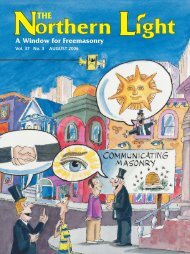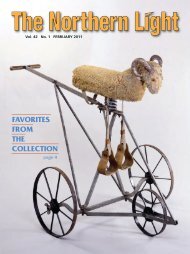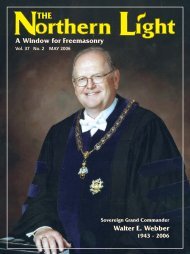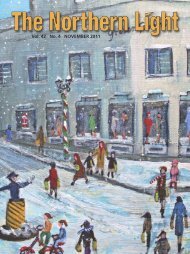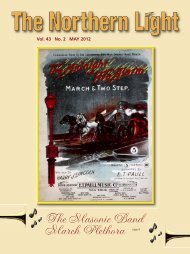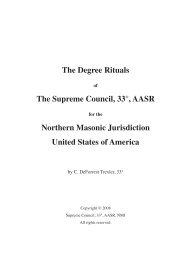May - Scottish Rite
May - Scottish Rite
May - Scottish Rite
You also want an ePaper? Increase the reach of your titles
YUMPU automatically turns print PDFs into web optimized ePapers that Google loves.
More than Just Books . . .<br />
Van Gorden-Williams Library & Archives at the National Heritage Museum<br />
WHY ARE MASONIC LIBRARIES AND<br />
MUSEUMS IMPORTANT?<br />
For the better part of a century, those who have worked<br />
in Masonic libraries have documented their<br />
discussions and communicated – both to the fraternity and<br />
the general public – the importance of Masonic libraries.<br />
Archival records, such as minutes books, ledgers, and<br />
certificates are essential in researching the history of<br />
Freemasonry and are often some of the most important<br />
collections to be found in Masonic libraries and archives.<br />
Books have been an important part of organized<br />
Freemasonry since its beginnings. It was only six short years<br />
after the founding of modern, organized Freemasonry that<br />
the first book, Anderson’s Book of Constitutions was published<br />
in 1723. And, of course, the Volume of Sacred Law, whether<br />
a Bible, Koran, or other holy book, is part of the “furniture”<br />
of the Masonic lodge. Recently published books contain<br />
new scholarship about the fraternity offering fresh<br />
interpretations of Freemasonry. The authors of these books<br />
themselves rely on the books, manuscripts, and other<br />
material found in Masonic libraries and archives as the basis<br />
of their research.<br />
Of course, libraries and archives face challenges. Consider<br />
this passage from “The Teachings of Masonry and How<br />
to Teach Them,” a paper by H.L. Haywood delivered at<br />
the Conference of Masonic Students and Librarians in<br />
<strong>May</strong> 1931:<br />
“Can a lodge make a success of a library? Not if it carelessly<br />
selects a miscellany of dead or dying books; not if it locks them<br />
up in a corner where nobody can get at them; not if it accepts<br />
from its members a dole of discarded volumes that have no<br />
bearing on Masonry at all; not if it uses its bookcases as a<br />
repository for hats, coats, bundles, umbrellas, old newspapers,<br />
and coverless magazines; above all, not if the library is in the<br />
care of a committee that knows little about library methods<br />
and cares less. But if a lodge prefers a few live books to many<br />
dead ones, if it faithfully and patiently employs recognized<br />
methods, if it selects a librarian who really knows his business<br />
and makes it move, if it gives books a break and knows that no<br />
book ever published can walk out of the shelves and get itself<br />
read, and if the off icers of the lodge take pains to keep the<br />
library before the attention of the Brethren – if a lodge does<br />
these things, its library will be a success beyond all<br />
peradventure of doubt.”<br />
This sentiment is something that may still be heard today<br />
by those who are struggling to make progress in organizing<br />
– or sometimes reviving – a lodge library, whether a modest<br />
collection of books in a local lodge or a larger collection in a<br />
Grand Lodge. The first question that often rears its head<br />
for those who are involved with such a task is “Where do I<br />
start? Whom can I talk to who has had experience with<br />
this?” Thankfully, there are places to turn.<br />
The Masonic Library and Museum Association<br />
(MLMA) was founded in 1995. Its mission is “to<br />
assist and support, through education, facilitation of<br />
communication, coordination of effort, and other means,<br />
those individuals charged with the collection, management,<br />
and preservation of the Masonic heritage.” Its members<br />
range from museum and library professionals who do this<br />
work for a living, to dedicated members of the fraternity<br />
who work voluntarily and have all different levels of<br />
experience. Membership in the MLMA is open to any<br />
person who expresses an interest in Masonic libraries or<br />
museums. Institutional membership is open to any Masonic<br />
body considered “regular” by most Grand Lodges in the<br />
United States. You can learn more about the organization at<br />
its website, MasonicLibraries.org.<br />
The <strong>Scottish</strong> <strong>Rite</strong> Masonic Museum and Library is a<br />
proud member of this organization and in 2006 co-hosted<br />
the annual meeting with the Grand Lodge of Masons in<br />
Massachusetts here at the museum. Having attended the<br />
past three annual meetings, I can speak from experience by<br />
saying that this is a group of dedicated, passionate<br />
individuals who all understand the importance of preserving<br />
Masonic heritage.<br />
The Van Gorden-Williams Library & Archives is<br />
located just off the main lobby of the <strong>Scottish</strong> <strong>Rite</strong> Masonic<br />
Museum & Library and is open to the public 10-4:30,<br />
Tuesday-Friday, and the first and third Saturday of each<br />
month. Reference assistance is provided in person, by<br />
phone, or by e-mail. You may contact us at 781-457-4109<br />
or library@monh.org.<br />
The Northern Light / <strong>May</strong> 2010 29



